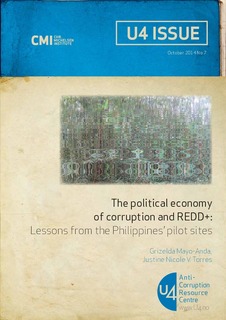The political economy of corruption and REDD+: Lessons from the Philippines’ pilot sites
Research report

Permanent lenke
http://hdl.handle.net/11250/2474972Utgivelsesdato
2014-10-17Metadata
Vis full innførselSamlinger
- Publications [1488]
Originalversjon
Bergen: Chr. Michelsen Institute (U4 Issue 2014:7) 30 p.Sammendrag
Corruption is a continuing feature of the Philippines’ natural resource sectors. Given keen interest in the country’s REDD+ potential, it is useful to consider corruption risks related to REDD+ from a political economy perspective. This U4 Issue draws on fieldwork from two REDD+ pilot sites to assess current governance and anti-corruption safeguards related to benefit-sharing, land tenure rights for indigenous peoples, and private sector involvement. Many anti-corruption actions are in place in the pilot sites, but they are weakly embedded in social relations at the local level. More work is required to raise awareness of the benefits of governance safeguards to livelihoods and security of land tenure. The lack of a national REDD+ coordinating body means that the collection and dissemination of relevant anti-corruption lessons for REDD+ nationally remains challenging. Existing anti-corruption initiatives require solid implementation strategies as well as adequate financial support.